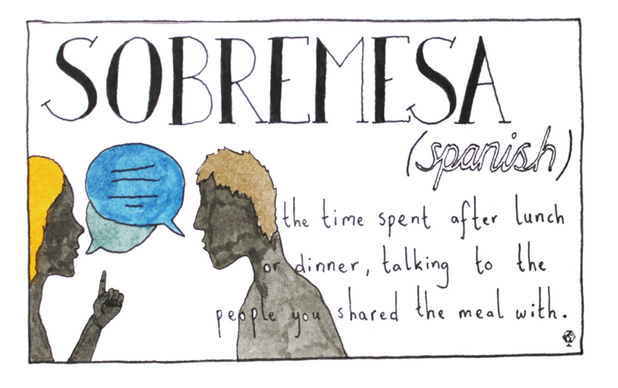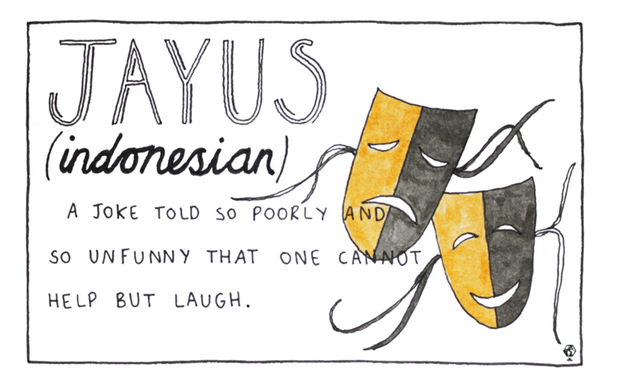Untranslatable Words
Being a language nerd, (next time you come by, ask to see my homemade Arabic, Chinese, and Bambara flashcard collection) I was unduly excited to come across this link to 11 untranslatable words illustrated by Ella Frances Sanders via Cup of Jo. Here are my favorite of the bunch:


 And thank GOD someone's finally come up with a term other than "dappled sunlight" to describe this:
And thank GOD someone's finally come up with a term other than "dappled sunlight" to describe this:
This reminded me that little while back, I wrote 5 Need-to-Know Words When Traveling the World for Huffington Post which Steven illustrated. My favorite term that we included was yala yala:
As long as we're on the topic of language, I'm going to go on the record saying that I think the whole "Inuits have a thousand words for snow" and "There's no word for 'never' in Swahili so they embrace life more" thing is BULLSHIT. Ok, the Inuits probably have a few more snow related terms that are a bit more descriptive than "slushy" but that's all I'm giving you. There's just NO WAY that Swahili speakers don't understand the whole concept of "oh hells no never ever" simply because they don't have one word for it.
The NY Times (my source of too many things if you've noticed by now) ran this great article on the whole discussion a while back.
I'm especially fond of this bit:
If a language has no future tense, for instance, its speakers would simply not be able to grasp our notion of future time. It seems barely comprehensible that this line of argument could ever have achieved such success, given that so much contrary evidence confronts you wherever you look. When you ask, in perfectly normal English, and in the present tense, “Are you coming tomorrow?” do you feel your grip on the notion of futurity slipping away? Do English speakers who have never heard the German word Schadenfreude find it difficult to understand the concept of relishing someone else’s misfortune? Or think about it this way: If the inventory of ready-made words in your language determined which concepts you were able to understand, how would you ever learn anything new? [Bold emphasis mine.]
It's a good read and goes into depth about some language quirks that do seem to affect perception, like gendered objects (a female fork in French and a male fork in Spanish lead speakers to assign female and male voices to the inanimate objects accordingly) and certain cultures that use the cardinal directions instead of left/right etc and how that can wreak havoc on a dance lesson.
All in all it just makes me glad that I'm not a Matses speaker who has to justify every sentence like a lawyer:
So if, for instance, you ask a Matses man how many wives he has, unless he can actually see his wives at that very moment, he would have to answer in the past tense and would say something like “There were two last time I checked.” After all, given that the wives are not present, he cannot be absolutely certain that one of them hasn’t died or run off with another man since he last saw them, even if this was only five minutes ago.
It also just cracks me up that this was the author's example. Not something like, "How many apples did you buy"/ "Last time I checked there were two in the bag". Nope. More like "Did you wife run off with your best friend or die? I mean, are you married?"
Anyway. I've got go have some lunch and sobremesa now.


